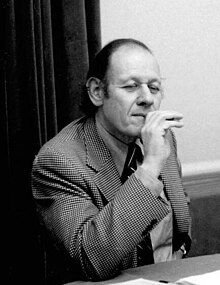
Back بول كيرتز Arabic بول كيرتز ARZ Paul Kurtz Catalan Paul Kurtz German Paul Kurtz Spanish پاول کورتز Persian Paul Kurtz Finnish Paul Kurtz French Paul Kurtz Hungarian Paul Kurtz Italian
Paul Kurtz | |
|---|---|
 Kurtz in 1979 | |
| Born | Paul Winter Kurtz December 21, 1925 Newark, New Jersey, U.S. |
| Died | October 20, 2012 (aged 86)[1] Amherst, New York, U.S. |
| Alma mater | New York University (BA) Columbia University (MA, PhD) |
| Era | 20th-century philosophy |
| School | Scientific skepticism, secular humanism |
Main interests | Philosophy of religion, Secularism, philosophical naturalism |
Paul Kurtz (December 21, 1925 – October 20, 2012)[2] was an American scientific skeptic and secular humanist. He has been called "the father of secular humanism".[3] He was Professor Emeritus of Philosophy at the State University of New York at Buffalo, having previously also taught at Vassar, Trinity, and Union colleges, and the New School for Social Research.
Kurtz founded the publishing house Prometheus Books in 1969. He was also the founder and past chairman of the Committee for Skeptical Inquiry (CSI, formerly the Committee for the Scientific Investigation of Claims of the Paranormal, CSICOP), the Council for Secular Humanism, and the Center for Inquiry. He was editor in chief of Free Inquiry magazine, a publication of the Council for Secular Humanism.
He was co-chair of the International Humanist and Ethical Union (IHEU) from 1986 to 1994.[4] He was a Fellow of the American Association for the Advancement of Science, Humanist Laureate, president of the International Academy of Humanism and Honorary Associate of Rationalist International. As a member of the American Humanist Association, he contributed to the writing of Humanist Manifesto II.[5] He was an editor of The Humanist, 1967–78.
Kurtz published over 800 articles or reviews and authored and edited over 50 books. Many of his books have been translated into over 60 languages.[6]
- ^ "Paul Kurtz, "giant" of humanism, dead at 86". Reuters. October 22, 2012.
- ^ "Paul Kurtz, 1925–2012". Center For Inquiry. October 22, 2012. Archived from the original on October 24, 2012. Retrieved October 22, 2012.
- ^ "Paul Kurtz – The New Atheism and Secular Humanism". CFI. September 14, 2007.
- ^ "Paul Kurtz an extraordinary proponent of Humanism, 1925–2012". International Humanist and Ethical Union. October 22, 2012. Retrieved October 22, 2012.
- ^ "Humanist Manifesto II". American Humanist Association. Archived from the original on October 20, 2012. Retrieved October 15, 2012.
- ^ Sandhu, Ranjit & Matt Cravatta. (2004). Media-Graphy: A Bibliography of the Works of Paul Kurtz Fifty-One Years, 1952–2003. Amherst, NY: Center for Inquiry, International. ISBN 978-1-59102-273-2.